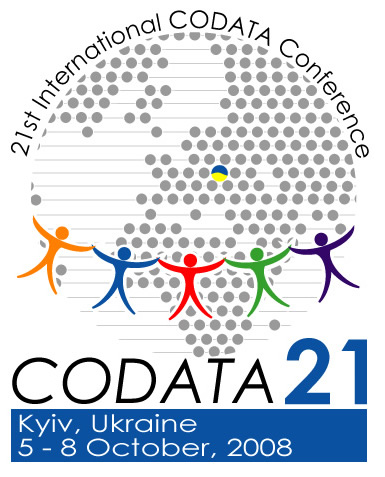Home
Call for Session Organizers
Call for Papers
Call for Papers from Young Scientists
International Programme Committee
Registration
Programme
Abstracts
CODATA Prize
Venue
Accommodations
Organization
About CODATA
Search
Contacts
|
CALL FOR SESSION ORGANIZERS
Those interested in organizing a session joining to one of the following list of topics or adding a new one to the following list of topics, please submit an abstract of no more than three pages for the session, including an outline of papers to be presented in the session if possible. Submit your session abstract by email to both codata@codata08.org.ua and cheryl@cheryllevey.com on or before 29 February 2008.
Deadline for Session Proposal: 29 February 2008
All the contributed papers of the organized sessions need to follow the same deadline and format. Please submit all the abstracts together in the organized session by email to both codata@codata08.org.ua and cheryl@cheryllevey.com on or before 29 February 2008.
Deadline for Abstract Submission: 29 February 2008
The paper size of each abstract should be 21*29.5cm (A4) with a margin of 3cm on the top and bottom and 2.5cm on the right and left. The abstract should be formatted using "Times New Roman" font throughout, single-spaced paragraphs, capitalized titles using 14 pt. type, and 12 pt. type for the body text. The abstract should be submitted as a ".doc" file attachment.
Sample Session Proposal (.doc file)
Topics:
Session 1. Scientific Data for Sustainable Development
- Information society and innovations;
- Data sources, criteria, and models for sustainable development;
- New directions in international scientific data coordination: the role of ICSU and its interdisciplinary bodies;
- Building a community of data scientists: promise and pitfalls;
- Preservation of and access to scientific & technical data in developing countries;
- International social science data archives: models, policies, & principles;
- External threats to freedom of access;
- Crossing the digital divide: recent progress in improving data management in the developing world;
- Role and operation of data centers and data services in the future;
- Panel on issues and concerns of data-oriented young scientists and curricula in data management and informatics.
Session 2 . e-Science and e-Science Networks
- International multi-disciplinary large data projects for science and education and for business applications; Global scientific data sharing and application;
- Regional and global e-science and cyberinfrastructure developments;
- Grid infrastructure and standards for resource sharing across networks and institutions;
- Advanced cluster computing algorithms for data processing in computational fluid dynamics, structural crash analysis, MEMS design, financial modeling, factory scheduling, etc.;
- Advanced distributed data processing methods for science and engineering applications;
Session 3. Infoscience and Computational informatics
- Theory, models and methods of the distributed data processing and archiving;
- New approaches to data transfer, storage and processing;
- Long - term data stewardship and digital preservation: institutional approaches and technical concerns;
- Data ICT and applications;
- Role of data for promoting public understanding on science;
- Preserving and digitizing legacy data.
Session 4 . Data Mining/Knowledge Management
- Enhancing the transformation of data to knowledge;
- Artificial Intelligence applications in science - based decision-making;
- Developing community databases: lessons from biodiversity, geochemistry, neurology, health, and other disciplines;
- Data security in Information and communication systems.
|
Session 5. Interoperability and Data Integration
- Interoperability of heterogeneous data systems on materials, environments, human sciences and other fields;
- Development of open access, data commons, information commons and open culture: building links between regional, disciplinary, and interdisciplinary initiative;
- Addressing linguistic barriers to scientific data integration and application;
- Data assimilation approaches and the role of interoperability standards in modeling and simulation applications;
- Human science integration and its synthetic research methodology;
- New frontiers in human science data integration.
Session 6. Earth and Environmental Data
- Sensor webs and networks for real-time monitoring and analysis;
- The emerging global earth observing system of systems: technical and policy issues;
- Implementing geospatial data infrastructures: progress at local, national , global levels and in geoscience data management ;
- Polar Year data policy and management;
- Strategy for IPY data management based on the scientific questions formulated in the IPY 2007-2008 Science Plan;
- Special needs of the social sciences, the Education, Outreach and Communications Plan, and the general public;
- Organizational data flow structure (including procedures of access, transmission and archival of data );
- Progress and problems in geoscience data management for the I*Ys;
- Role of data in climate change mitigation and adaptation.
Session 7 . Biological Science, Medical and Health Data
- Bioinformatics; Proteome Database; Genetic Data Issues;
- Biodiversity; Observation and Specimen Records (Access to Biological Collection Data)
- Risks Data of dangers for safely life (disasters, illnesses, etc.);
- Measuring people and their health: scientific and ethical issues;
- Organizing disaster and health risk in support of disaster management;
- A challenge to scientific risk estimation on health effects of Chernobyl dose radiation.
Session 8 . Physical Science Data
- The Fundamental Constants: cross-disciplinary coordination and standards issues;
- Materials science data and its multidisciplinary applications.
- Gas Hydrates;
- Informatics in energy resource management;
- Managing Astronomical Data ; Lessons learned in the development of virtual observatories.
|
|
